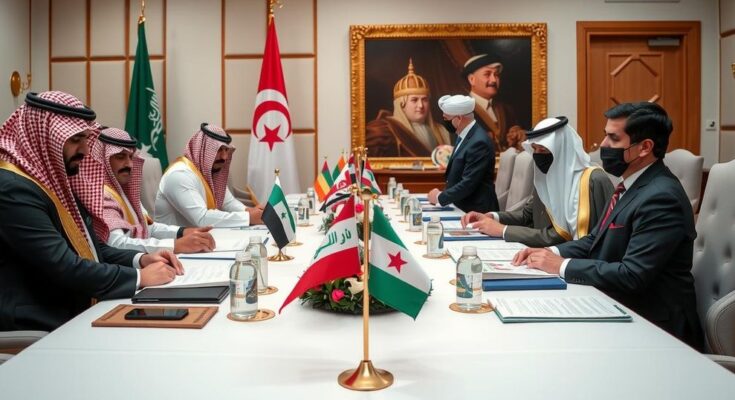Top diplomats from Western and Arab nations convened in Riyadh to discuss sanctions relief for Syria following the ouster of President Bashar al-Assad. The meeting emphasized the need for international support as the new government, led by HTS, seeks to stabilize the country and address humanitarian needs. Analysts speculate that the U.S. and European nations may reconsider their sanctions policies to aid in Syria’s recovery efforts.
In a significant diplomatic gathering, top Western and Arab leaders congregated in Riyadh, Saudi Arabia, to deliberate the future of Syria following the ousting of President Bashar al-Assad. The assembly, the first of its kind since this political shift, featured foreign ministers from nations including Saudi Arabia, Egypt, the UAE, Qatar, Bahrain, Iraq, Jordan, Lebanon, and Turkiye. An emphasis was placed on sanction relief for Syria, led by the new administration under Foreign Minister Asaad Hassan al-Shaibani, who is advocating for the removal of long-standing economic sanctions.
The conference gained further importance with the attendance of prominent Western diplomats, including U.S. Under Secretary of State John Bass, German Foreign Minister Annalena Baerbock, and British Foreign Secretary David Lammy. This meeting unfolds against the backdrop of an appeal from Syria’s new leaders, represented by Hayat Tahrir al-Sham (HTS), which has requested the lifting of sanctions to promote international financial support. Publicly, the Biden administration appears to be aligning its sanctions policy with the desires of HTS, as analysts suggest that certain restrictions may be either modified or placed on hold.
Recent actions by the U.S. include a temporary sanctions exemption for transactions with Syria’s governing bodies aimed at facilitating humanitarian assistance. Meanwhile, leaders from Germany, Italy, and France have advocated for the easing of EU sanctions, though final resolutions require consensus across the EU bloc. Key discussions at the gathering also addressed sanctions that impede the nation’s rebuilding efforts, as there are concerns about maintaining sanctions against certain individuals connected to al-Assad’s regime who participated in war crimes during the civil conflict.
The assembly is characterized as a foundational step in engaging with Syria’s new rulers in a context of international diplomacy. Prior meetings involving officials from the U.S., UK, France, Germany, and the EU had been held to address concerns regarding the implications of al-Assad’s ouster and the direction of Syria’s governance under HTS, suggesting a cautious yet hopeful approach towards normalization and international recognition of the new administration.
The recent diplomatic meeting in Riyadh signals an important shift in international relations regarding Syria, particularly in light of the dramatic political changes following the recent removal of President Bashar al-Assad. The meeting serves as a platform for dialogue among key Western and Arab stakeholders, focusing on potential sanctions relief aimed at reviving Syria’s economy and addressing pressing humanitarian needs. This event marks a turning point and reflects a broader willingness among nations to reconsider their approaches to Syria’s governance and stability post-Assad.
In conclusion, the gathering of Western and Arab leaders in Saudi Arabia represents a pivotal moment for Syria as the new administration advocates for sanctions relief. With the involvement of notable diplomats from various nations, there is potential for significant shifts in policy that could facilitate humanitarian assistance and support the rebuilding of the nation. The outcome of these discussions will be critical in defining Syria’s future and fostering international cooperation.
Original Source: www.aljazeera.com




